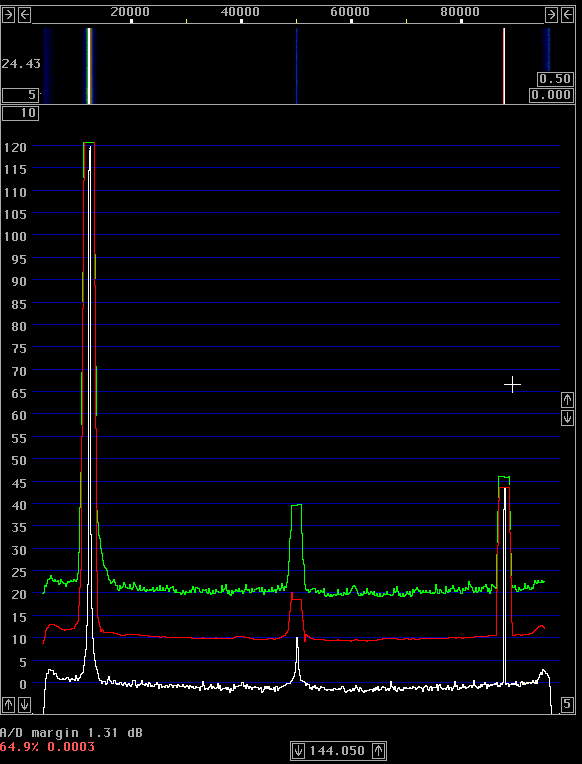
Fig. 1. Linrad and WSE converters in "Tx test mode" with a good crystal oscillator used as the transmitter under test.
Setup to measure transmitter spectral purityThese measurements were made with Linrad running on a PentiumIV 2.66GHz computer with a modified Delta44 soundcard. The RF signals were converted to audio by use of the WSE converters RX144 or RXHFA, RX70, RX10700 and RX2500.The measurement system has much better dynamic range than required for these measurements so no corrections have to be made for the noise contribution from the measurement system. The unit under test was connected to a 20dB 100W attenuator followed by an ordinary step attenuator which was connected to the RXHFA or RX144 unit. The step attenuator was adjusted to place the signal approximately 1.5 dB below A/D saturation. The transmitter frequency was set to about 14.125 or 144.125 MHz and Linrad was run in the "tx test mode". Linrad was also run in normal receive mode in which time domain graphs are available with the F4 key. The screen of Linrad in tx test mode looks like figure 1 in which a good crystal oscillator is fed into the system. There are three spectra shown simultaneously. The red line is the average spectrum in a bandwidth of 2.4 kHz. Note that the noise floor is about 110 dB below the carrier. 10log(2400)=34 so this means that the noise floor is at about -144 dBc/Hz. |

Fig. 1. Linrad and WSE converters in "Tx test mode" with a good crystal oscillator used as the transmitter under test. |
|
The white line is the average spectrum just as it would be displayed in normal operation of Linrad. Here one can see narrowband spurs. In figure 1 the white curve is about 11 dB below the red curve which means that the bandwidth is about 200 Hz in this particular measurement. The green curve is the peak power in 2.4 kHz bandwidth. For white noise, the peak to average ratio is about 11.5 dB. For a pure carrier, the peak power is equal to the average power. Note that the zero frequency spur has a much higher peak to average power ratio than 10 dB, it is the 1/f noise of the Delta44 soundcard that produces a narrowband signal with an 1/f modulation on it. The mirror image spur has a peak to average ratio of about 2 dB. This is because the image suppression depends on the phase with respect to the sampling clock. The way the mirror image is suppressed in Linrad limits the suppression to about 70 dB because of this phenomenon. Continous carrierThe raw data is available here: IC-275HIC-746 Qrolle (whistling into microphone) VX150 VX2R The spectral purity of a continuous carrier is listed in table 1. In this table spurious signals are excluded. To see the spurs, look at the spectra. |
Model and ser.no Freq Noise floor in -dBc/Hz
(MHz) 5kHz 10kHz 15kHz 20kHz 30kHz 40kHz 50kHz
IC275H 01795 144 109.5 120.9 127.1 130.4 135.0 137.2 137.5
IC746 03361 144 105.9 112.3 115.9 118.3 121.5 123.7 124.8
Qrolle 14.15 116.1 120.4 121.6 123.5 125.8 126.1 -
Qrolle 14.35 115.6 122.9 126.4 128.8 130.2 130.9 131.1
VX150 144 100.3 106.7 110.2 112.4 115.9 118.5 120.4
VX2R 144 95.8 106.0 110.8 114.2 118.5 121.6 123.1
Table 1. Carrier noise floor at different frequency separations.
|
Spectral purity of SSB transmissionsThe IC-746 suffers from ALC-generated splatter like most modern transceivers. It also generates pulses when the PTT button is used. for details, look at SSB spectra from IC-746br> The Qrolle transceiver does not have any ALC problem. The splatter it generates comes from non-linearities in the power amplifier. For details look at SSB spectra of Qrolle. Spectral purity and time domain waveforms of keyed CW transmissions.The IC-275H was modified for the ALC to not affect the keying waveform. The spectrum shows no keying clicks as can be seen here: Keyed CW spectrum of a modified IC-275The IC-746 suffers from ALC generated keying clicks. For spectra and waveforms look here: Spectra and time domain waveforms of a keyed IC-746 To SM 5 BSZ Main Page |